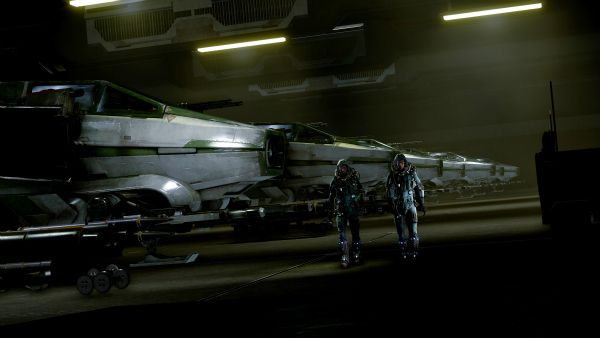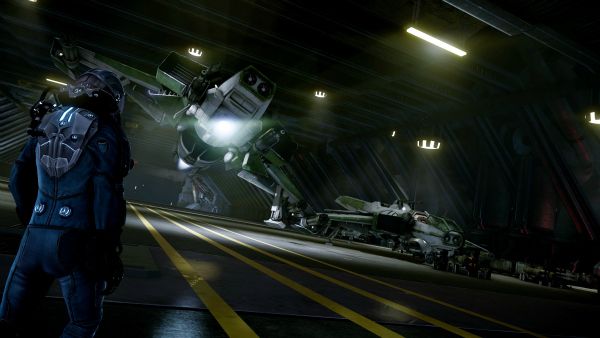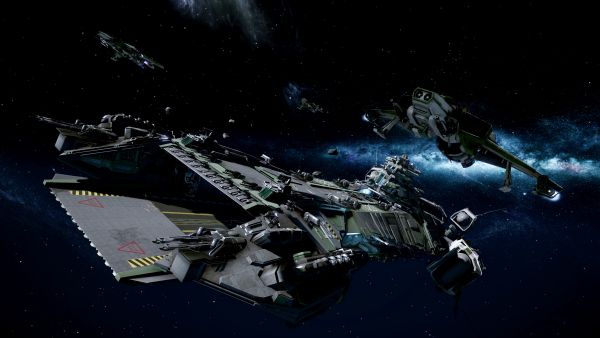Chris Roberts could be forgiven for taking early retirement. Creating videogames since his late teens and putting the finishing touches to the legendary Wing Commander by the time he was just 22, the California-born pioneer had led gaming’s fledgling generation to infinity and beyond when most people his age were taking their first tentative steps into the real world.
In the years that followed, Roberts oversaw the continuing evolution of the Wing Commander series, added critical hits like Freelancer to his portfolio, and even took his place amid the Hollywood Hills to produce a run of big budget films.
Despite such notable successes, however, the constantly creative Roberts isn’t about to rest on his laurels. Last October, a crowd-funding campaign was launched to try and raise support for Star Citizen; a new space sim that is perhaps his most ambitious project to date and the culmination of ideas that have been brewing for close to three decades.

The game, promised Roberts in his pitch to would-be backers, will feature an ever-evolving universe focused on epic space adventure, trading and dogfighting. Star Citizen, he said, would mark a return to a golden age of space sims whilst simultaneously thrusting the genre – and gaming as a whole – to uncharted new territories.
Less than 12 months later, Roberts’ belief that PC gamers still have an appetite to explore distant galaxies has been confirmed in record-breaking fashion, with fans having pledged over $8.5million to date to make sure Star Citizen is everything they, and its visionary creator, have dreamed it could be.
“I think players love games like this, but they’ve been away for a while and were really missed, so a lot of people got behind it – which was great,” said Roberts when asked if he’d been surprised by the extent of the support Star Citizen has inspired. “I thought we had a chance to do well, but I didn’t think we were going to do as well as we’ve done. It felt like some day, someone could do a lot of money on crowd funding a game, but I was thinking that maybe we could do between two to four (million dollars), which was kind of what people had done before, and I based it on the crowd of Wing Commander and how popular it was. So yeah, it sort of surprised us that it went as well as it did, but now we’ve got deliver, and we will.”

For Roberts, “delivering” means creating a game that boasts production values on par with today’s AAA titles whilst, at the same time, capturing players’ imaginations and immersing them in a diverse and original universe. The latter is a challenge that he acknowledges to be potentially harder in 2013 than it was in 1990 due to the sheer volume of on-screen entertainment consumed today. “I think this a problem with the movies too. I certainly remember seeing some movies when I was a kid and I was completely blown away and swept up in that world, but I see movies now and very rarely do I get there. I don’t know if that’s just because I’m older and I’m not a kid anymore, but I’m certainly going to try and make Star Citizen as cool and amazing as possible, so hopefully it’ll be as captivating as Wing Commander was. We’ll try our best!”
In his quest to captivate players all over again, Roberts says one important advantage is simply the fact Star Citizen is an original IP. And when asked whether the high regard his previous games are held in could leave him open to the kind of backlash leveled against the second wave of Star Wars movies, he also believes the newness of the franchise is a benefit. “It’s a little easier with Star Citizen because I’m not making a sequel – it’s not like this is Wing Commander 7 or something. So it’s a new universe, and you always have a bit of a new slate. I think the problem for the Star Wars movies was that the later ones felt like they weren’t in tune with the people that grew up with them, right? They had this vision of what Star Wars was and George Lucas made something that was different from that. So there were a lot of angry older people – and then the kids loved it! We’re trying to do things that haven’t been done in Wing Commander, Privateer or Freelancer. Star Citizen will be its own thing.”

In the extended video that Roberts’ Cloud Imperium studio first put out to breathe life into their crowd funding campaign for Star Citizen, the man himself outlined in detail some of those features that he believes will set the game apart. As ever, his vision is vast and his desire to push gaming forward, rather than drag it back to a bygone era, is clear.
“We’re doing some things with the online aspect of the game that I think haven’t necessarily been tried yet in standard MMOs out there. For example, giving a sense of mortality to your character: Time passes, people die, your descendents take over the mantle. And so the universe, if it works well, will have a sense of history where you can look back on your family line, and what your family achieved. So there are things like that, and there are things around the conversation system that I’m thinking about doing that are much more about managing relationships with people and less about having three text options that you can choose from – again to try and make everything feel more immersive. For me, it’s not necessarily feeling like I want to do something better than someone else, it’s more about how I feel about the game I want to play.”
Also adding to the joy of intergalactic exploration in Star Citizen will be the array of ships at your disposal and the wealth of ways in which you can tweak them. Roberts says the variety of approaches to ship customization is indicative of the game’s overall ethos. “One of the core designs of Star Citizen is that you can go really deep into the game, but if you don’t want to, on the surface level, it’s easy to play. So, for example, we’re taking this approach on the ship design that’s very much like modern PCs. You can go and build your custom computer if you want, and overclock different units like the CPU and GPU – and you can do the equivalent of all that stuff on your ship, or you can just get a ship ‘off the shelf’ like an off-the-shelf computer. Hopefully it will be fun and simple up front, but it will be pretty deep if you really want to get into it.”

Roberts’ simple aim of seeking to make a game that he would like to play takes on an interesting new significance against the backdrop of crowd funding. For the first time, developers find themselves in a position to get ahead if a large enough chunk of the population are ready to validate their vision. It is, he says, a change for the better that will become even bigger in future.
“There’s a whole area of games that went away that would sell maybe a million or two million copies that a few years ago were good business, and now the publishers aren’t interested unless they’re selling five million-plus, and more likely they really want ten million copies, or it doesn’t make financial sense in their huge infrastructure. The crowd funding is allowing more of the sort of RTS games or newer games, or a space sim like we’re doing, to come back and be viable, which is great. So I just sort of feel like what crowd funding does is that it gives a voice to the gamer, and they find it pretty intoxicating when they get to say, ‘Yes, I want to see this game,’ and they get to help make it happen.”
Crowd funding isn’t the only evolution in the games industry that Roberts singles out as being a positive change. In his years away from development, he feels one of the most significant steps forward has been in the rise of quality middleware tools that developers can depend on to bring their ideas to life.

“When I was making games in the past I always had to build my own engine, and there was a lot of investment because every single one of my games was made with technology built from the ground up. So a good portion of your development time was spent in actually just building the technology, and now I feel like there’s a lot of really good, mature technologies out there that you can just take and build on top of. You’ve only got so many years, days, hours, whatever – and your team is only so big, so if I don’t have to build the basics of a 3D engine I can spend more time making a great game, and just enhancing the engine to do things that are perfect for Star Citizen.”
Despite acknowledging the overall progress made in game engine technology in recent years, the man who once relied on his own know-how to build development tools from scratch felt there was one stand-out choice when it came to picking the engine for Star Citizen.
“I made the decision to go for CryENGINE because I felt like its DNA was PC, which is what I’m focusing on. It was very powerful and expandable – so we were able to take the engine and build extra functionality for the space ships, and that’s obviously an important part of our gameplay. And then the rendering look and feel of CryENGINE is more photo-realistic, and I wanted to go for that almost film visual effect, not quite as stylized as some engines come across. CryENGINE does that really well.”

Of course, the challenge of creating a game on the scale of Star Citizen demands the talents of more than one man. In 2011, Roberts founded Cloud Imperium; a development studio he says is built on a mutual love of the space sim genre and old-school creative ethics.
“Everyone at the company is focused on making the kind of game that they love and that they haven’t seen for a while, and trying to have fun doing it. We have a tight company that doesn’t feel too big or too corporate, where everyone can go and get lunch together and have a laugh together. I’m trying to recreate a little bit of the energy I felt at say, Origin, when I was there a long time ago in the early days, and when I was making Wing Commander and Richard Garriott was making Ultima – it felt like a pretty tight knit group of people, all making games that they were really excited by.”
Making games that he is excited by has taken Chris Roberts a long way over the course of his career, and the support for Star Citizen already bears testimony to the power of pursuing your big idea. But what is he, personally, most looking forward to doing in the game when it reaches its finished state?
“I think it’s a combination of the dog-fighting stuff, which I think is going to be really great, and then some of the exploration stuff – discovering a jump point for the first time, discovering asteroid fields full of rich minerals, selling a map you’ve charted and that sort of thing. These are all aspects that I haven’t really done in past games, and they’re interesting to me and I want players to feel like they’re actively in this universe. Doing some of that stuff will be pretty cool.”
“And I think the other big thing, which I’ve always wanted to have in a game, but never have, relates to the ships. In Star Citizen it ranges from small one person ships to space ships that can have dozens of people running around, sitting on the captain’s chair, flying the ship, going down to the engine room to fix the engine – that kind of stuff. So planning to do a space battle in Star Citizen will, I think, be pretty cool.”
Whatever ideas find their way into the final version of the game, Chris Roberts’ track record should leave those who dipped into their pockets to make it happen confident of one thing: More than 20 years after he first broke the mold and redefined a genre with Wing Commander, he’s still shooting for the stars.
For more information on Star Citizen visit www.robertsspaceindustries.com



